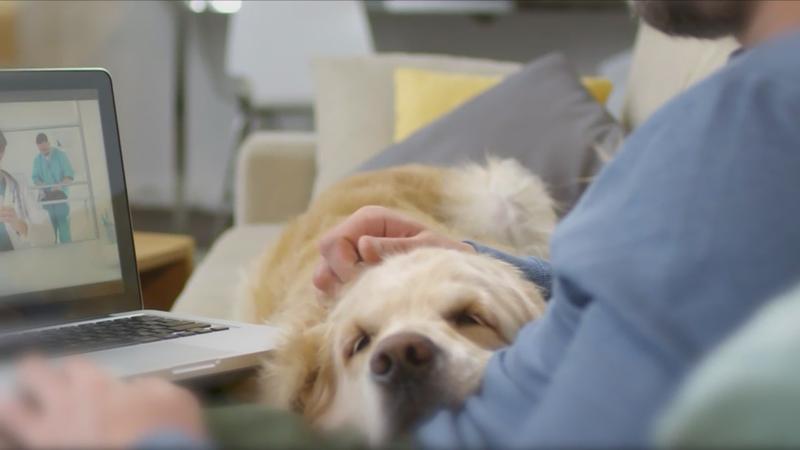In-Depth: Pet care crisis
[anvplayer video=”5071499″ station=”998131″]
ROCHESTER, N.Y. (WHEC) — If you’ve had a pet in need of medical care in the past year, you already know veterinarian offices are backed up. Everything changed during the pandemic, and now it’s not getting much better.
News10NBC is going in-depth on the pet care crisis.
Most of you know, I’m a crazy cat lady. I take on that title with pride! So when my cat, Casey got sick this summer I was desperate to get her in to see a vet immediately. However, it’s not that easy these days whether you have a cat or a dog.
"She’s still kicking!" said Sarah Lustig of Irondequoit as her dog Chloe came over looking for to be petted.
Chloe is a 14-year-old black collie mix. She has the white whiskers to prove it! She moves a little slower than her rambunctious brothers, Turk and Caico. They are 10.

[News10NBC]
"We adopted them in 2012 from the Turks and Caicos Islands in the Caribbean. They’re a mixed breed," Lustig said.
The two puppies were found huddled together under a bush. Lustig fell in love!
"My husband and I don’t have kids, and so they’re my family," Lustig explained. "They’re my babies and I love them to death. We’ll do anything for them."
So when Chloe stopped eating a few months ago Lustig was super stressed.
"You notice okay, something’s not right. It can be stressful knowing it’s going to be three weeks before an appointment can happen," Lustig said.
Three weeks? That’s actually not abnormal.
"I would say two to three weeks is probably what we’re booking out," said Dr. Bill Murphy, owner of Westside Animal Hospital in Chili. "Right now the big problem is with emergencies. Emergency clinics are slammed."
So what is causing the backlog? A lot of people blame the pandemic.
"People want puppies and kittens because they’re lonely," Dr. Murphy said. "I think there are more people adopting."
Despite reports of a pandemic pet adoption boom, data from our local shelters shows pet adoptions actually went down during the pandemic.
At Rochester Animal Services adoptions, pets returned to homes and transfers were down by nearly 40-percent between 2019 and 2020.
| 2019 | 2020 | 2021 (10 months) | |
| Dogs | |||
| Intakes | 1,641 | 1,177 | 948 |
| Adoptions | 804 | 488 | 345 |
| Returns to homes | 326 | 349 | 317 |
| Transfers | 222 | 130 | 80 |
| Cats | |||
| Intakes | 1,700 | 934 | 822 |
| Adoptions | 821 | 327 | 234 |
| Returns to homes | 38 | 28 | 35 |
| Transfers | 627 | 411 | 399 |
"Nationally, there have been fewer animals in shelters throughout the pandemic, therefore, the adoption numbers have been below pre-pandemic levels," explained Chris Fitzgerald, the Director of Rochester Animal Services.
At Lollypop Farm, I found similar numbers. Positive outcomes for pets coming into the shelter decreased by nearly 30% between those same years.
| 2019 | 2020 | 2021 (10 months) |
| 5,007 | 3,562 | 3,808 |
Lollypop Farm officials say during the height of the pandemic, admissions were limited to emergencies only. Lollypop also encouraged people to re-home their pets on their own to keep them out of the shelter.
Of course, we know fewer pets were admitted during the pandemic, and we know not everyone adopts from shelters.
So what are the other issues? Here’s what I found. It’s taking more time to get animals in the office. Some veterinarians are still working curbside where pets are dropped off at the door.
Plus, there is all the extra cleaning.
"You’ve got to disinfect the rooms between every appointment," explained Dr. Murphy.
All those COVID protocols take more time. So a lot of veterinarians are seeing fewer patients per hour. According to the American Veterinary Medical Association, productivity among vets declined by almost 25% in 2020 compared to the year before.
Another issue: Not enough workers.
"We’re trying to hire people, and it is tough hiring people. Right now there is a crunch just like there is in restaurants and everything else," Dr. Murphy said.
Dr. Murphy says qualified candidates just aren’t applying. It’s something we’re seeing at workplaces across the country.
Then, there’s burnout.
"Please be patient when you do call," requested Dr. Murphy. "The receptionists are doing their best."
While veterinarians are dealing with all these issues, they’re also trying to take care of your pet. Tensions can run high.
I asked Dr. Murphy if he thinks it will get better any time soon.
"I think so. I think everything’s going to get better," Dr. Murphy said.
People like Lustig hope that’s the case. Thankfully, she was able to get Chloe an emergency appointment at her vet’s office, and Chloe just needed some antibiotics for a tooth infection.
"They’re my kids. I wake up them every day. I snuggle with them every night, and they’re my babies," Lustig said. "I can’t think of a world without them."
Just like Lustig, I was able to get an emergency appointment with my veterinarian. They did everything they could, but Casey had non-treatable lymphoma. She passed away in October.
The best advice: Think ahead about shots and wellness visits. Also, develop a relationship with your local veterinarian. They’ll do their best to take care of your furry family member.